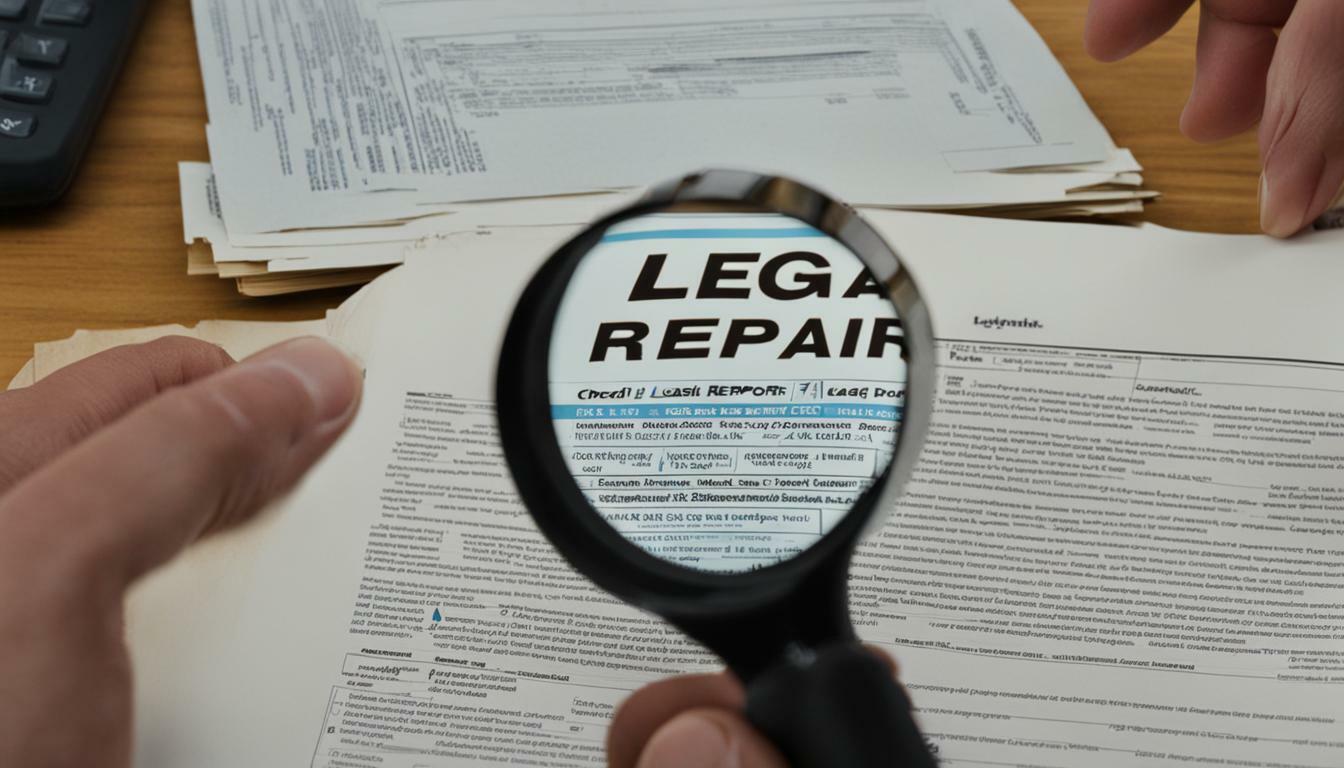Understanding the Legal Aspects of Credit Repair: A Guide

Credit repair is a complex process that requires a thorough understanding of the legal guidelines and requirements set forth by regulatory bodies. To navigate the credit repair journey successfully, it is vital to have knowledge of the laws governing credit repair and the protections available to consumers.
Image:
Key Takeaways:
- Legitimate credit repair takes time, effort, and adherence to a debt repayment plan.
- The Fair Credit Reporting Act (FCRA) grants individuals the right to dispute inaccurate information on their credit reports and obtain free annual credit reports from Equifax, Experian, and TransUnion.
- The Credit Repair Organizations Act (CROA) prohibits credit repair companies from making false claims, engaging in fraudulent activities, and charging upfront fees.
- State laws regulate credit repair and may require credit repair companies to have licensed attorneys on staff.
- Beware of credit repair scams and exercise caution when seeking professional help, filing complaints with the FTC and your state Attorney General’s office if necessary.
The Fair Credit Reporting Act (FCRA) and Your Rights
The Fair Credit Reporting Act (FCRA) grants individuals the right to dispute any inaccurate or incomplete information on their credit reports. Under this act, you have the power to take control of your creditworthiness and ensure that your credit report reflects accurate and up-to-date information. By exercising your rights under the FCRA, you can work towards improving your credit score and financial standing.
One of the key provisions of the FCRA is the ability to request a free credit report once a year from each of the three major credit bureaus: Equifax, Experian, and TransUnion. It is important to regularly review your credit report to identify any errors or discrepancies that may be negatively impacting your credit score. By disputing inaccurate information, you can have it removed or corrected, which can ultimately improve your creditworthiness.
🚨 TUIC Errors + Low Credit Score?
CreditScoreIQ helps you build credit faster by reporting utility bills to all 3 bureaus—while you dispute errors.
Start Building Credit Today →It is crucial to note that credit repair companies cannot do anything legally that you cannot do for yourself. The FTC warns against credit repair services that make false claims or promise a quick fix for credit issues. Legitimate credit repair takes time, effort, and a commitment to managing your debt responsibly. By being proactive and understanding your rights under the FCRA, you can navigate the credit repair process effectively and avoid falling victim to fraudulent practices.

The Credit Repair Organizations Act (CROA) and Consumer Protection
The Credit Repair Organizations Act (CROA) was enacted to safeguard consumers from deceptive practices in the credit repair industry. This federal law establishes guidelines and regulations that credit repair companies must follow to protect the rights and interests of individuals seeking to improve their creditworthiness. Understanding the legal framework set forth by the CROA is crucial for both consumers and credit repair service providers to ensure compliance and ethical practices.
One of the key provisions outlined in the CROA is the prohibition of credit repair companies making false claims or promises to consumers. These false claims often lure individuals in with the promise of a quick fix to their credit problems, when in reality, legitimate credit repair takes time and a strategic approach towards debt repayment. The Federal Trade Commission (FTC) warns against falling prey to such false promises and advises individuals to be cautious when seeking professional credit repair services.
Additionally, the CROA addresses the issue of upfront fees charged by credit repair companies. According to the law, credit repair organizations are prohibited from charging any fees before they have performed the promised services. This provision is in place to protect consumers from being financially exploited by predatory practices. However, it is important to note that some states may have additional regulations regarding fees and licensing requirements for credit repair companies, further emphasizing the need to be aware of your state’s specific consumer protections.
| Key Provisions of the Credit Repair Organizations Act (CROA) |
|---|
| The prohibition of false claims and promises |
| The prohibition of upfront fees |
| The requirement for written contracts outlining services and fees |
| The provision for a three-day right to cancel without penalty |
If you suspect that you have been a victim of a credit repair scam or that a credit repair company has violated the provisions set forth by the CROA, it is essential to report the incident to the appropriate authorities. You can file a complaint with the Federal Trade Commission (FTC) and your state Attorney General’s office. By reporting fraudulent practices, you not only protect yourself but also help protect other consumers from falling victim to deceptive credit repair services.

Understanding the legal aspects of credit repair, including the regulations set forth by the CROA, is crucial for individuals looking to improve their credit and avoid scams. By knowing your rights and staying informed about the legal framework governing the credit repair industry, you can make informed decisions and take necessary steps towards achieving financial stability.
State Laws and Consumer Protections
In addition to federal regulations, credit repair is also subject to state laws, which vary in terms of consumer protections and requirements. These state laws play a crucial role in ensuring that individuals receive fair and transparent credit repair services. Understanding the legal implications and considerations specific to your state can help you make informed decisions when seeking credit repair assistance.
State Consumer Protections
Each state may have its own set of laws that govern the credit repair industry and provide additional consumer protections. For example, some states require credit repair companies to be registered or licensed with a regulatory agency. They may also impose restrictions on fees that can be charged and establish guidelines for advertising and marketing practices. Being aware of these protections can help you assess the legitimacy of credit repair services and avoid potential scams.
Attorney Requirements
Some states require credit repair companies to have licensed attorneys on staff in order to provide services. These attorneys can offer legal advice and representation, ensuring that all credit repair actions comply with state and federal laws. If your state has this requirement, it is essential to choose a credit repair company that adheres to these regulations to protect your rights.
Where to Find Information
If you are unsure about the credit repair regulations in your state, you can consult your state’s Attorney General’s office or the Department of Consumer Affairs. These resources typically provide information on the specific laws and regulations governing credit repair services. Additionally, they may offer guidance on how to spot potential scams, file complaints, and seek recourse if you believe your rights have been violated.
| State | Registration/Licensing Requirement | Attorney Requirement |
|---|---|---|
| California | Yes | Yes |
| Texas | Yes | Yes |
| Florida | Yes | No |
| New York | No | Yes |
It is important to note that the table above is not exhaustive and regulations may change over time. Therefore, it is highly recommended to consult the relevant state authorities for the most up-to-date information on credit repair laws and requirements.

Unfortunately, credit repair scams are common, making it crucial for consumers to be vigilant and informed in order to protect themselves from fraudulent practices. Scammers often prey on individuals who are desperate to improve their credit scores quickly and easily. However, it’s important to remember that there is no magic solution to repairing credit, and any claims that promise instant results should be met with skepticism.
The Federal Trade Commission (FTC) warns against credit repair services that make false claims, as there is no quick fix for creditworthiness. Legitimate credit repair takes time, effort, and sticking to a debt repayment plan. Be wary of companies that promise to remove accurate negative information from your credit report or guarantee a specific credit score increase. These claims are often misleading and can leave you worse off financially.
“Be wary of companies that promise to remove accurate negative information from your credit report or guarantee a specific credit score increase.”
One way to protect yourself from credit repair scams is to educate yourself about your rights under the law. According to the Fair Credit Reporting Act (FCRA), individuals have the right to dispute inaccurate or incomplete information on their credit reports. They can request a free credit report once a year from Equifax, Experian, and TransUnion. Credit repair companies cannot do anything legally that individuals cannot do for themselves.
The Credit Repair Organizations Act (CROA) also plays a role in protecting consumers. This law regulates the credit repair industry and prohibits credit repair companies from making false claims, altering identities, engaging in fraudulent activities, and charging upfront fees. It’s important to research any credit repair company you are considering working with to ensure they comply with these regulations.
To protect yourself from credit repair scams, it’s crucial to be cautious when seeking professional help. Research any company thoroughly, check for complaints with the FTC and your state Attorney General’s office, and ask for references from satisfied clients. Remember, improving your credit takes time and effort, but with the right information and a plan, you can achieve your financial goals.
| Warning Signs of a Credit Repair Scam |
|---|
| Guarantees to remove all negative information from your credit report |
| Requires payment upfront before services are provided |
| Advertises a “new credit identity” through the use of an Employer Identification Number (EIN) instead of a Social Security Number |
| Pressures you to provide false information or dispute accurate negative information on your credit report |
| Does not provide a written contract outlining the services they will provide and the cost |
| Refuses to answer questions or provide references from satisfied clients |

If you suspect a credit repair scam, it is important to take action and report the fraudulent activities to the appropriate authorities. Credit repair scams are unfortunately common, and they can leave individuals in even worse financial situations than before. By reporting these scams, you not only protect yourself but also help prevent others from falling victim to similar schemes.
To report a credit repair scam, start by filing a complaint with the Federal Trade Commission (FTC). The FTC is the primary federal agency responsible for enforcing consumer protection laws, including those related to credit repair. You can submit your complaint online through the FTC’s Complaint Assistant website, which guides you through the process and collects necessary information to investigate the scam.
“If you suspect a credit repair scam, it is important to take action and report the fraudulent activities to the appropriate authorities.”
In addition to filing a complaint with the FTC, it is recommended to contact your state’s Attorney General’s office. They may have specific resources or initiatives to combat credit repair scams in your state. Provide them with any documentation or evidence you have regarding the fraudulent activities, as this can aid in their investigation.
By reporting credit repair scams, you contribute to the efforts of government agencies and law enforcement to shut down fraudulent operations. Your actions help protect consumers, promote transparency in the credit repair industry, and ensure that legitimate individuals and companies can continue to assist those in need of credit recovery.

| Important Contact Information: | Website: |
|---|---|
| Federal Trade Commission (FTC) | www.ftccomplaintassistant.gov |
| Your State’s Attorney General’s Office | Contact information available on your state’s official website |
Conclusion
Understanding the legal aspects of credit repair is crucial for anyone seeking to improve their creditworthiness and financial future. It is important to recognize that there is no quick fix for credit repair, and legitimate credit repair takes time, effort, and adherence to a debt repayment plan.
Under the Fair Credit Reporting Act (FCRA), individuals have the right to dispute inaccurate or incomplete information on their credit reports. They can obtain a free credit report once a year from Equifax, Experian, and TransUnion. It’s essential to know that credit repair companies cannot do anything legally that individuals cannot do for themselves.
The Credit Repair Organizations Act (CROA) regulates the credit repair industry and serves as a protective measure for consumers. This law prohibits credit repair companies from making false claims, engaging in fraudulent activities, altering identities, and charging upfront fees.
In addition to federal regulations, state laws also play a vital role in regulating credit repair. Depending on your state, there may be specific consumer protections in place, and some states require credit repair companies to have licensed attorneys on staff. It is essential to familiarize yourself with your state’s laws to ensure compliance and protection.
Unfortunately, credit repair scams are prevalent, and it is crucial to exercise caution when seeking professional help. Remember to know your rights and be vigilant in recognizing the signs of a scam. If you believe you have encountered a credit repair scam, you can file a complaint with the Federal Trade Commission (FTC) and your state Attorney General’s office.
FAQ
Q: Are credit repair services a quick fix for my creditworthiness?
A: No, the Federal Trade Commission (FTC) warns against credit repair services that make false claims. Legitimate credit repair takes time, effort, and sticking to a debt repayment plan.
Q: What rights do I have under the Fair Credit Reporting Act (FCRA)?
A: The FCRA grants you the right to dispute inaccurate or incomplete information on your credit reports. You can request a free credit report once a year from Equifax, Experian, and TransUnion. Credit repair companies cannot do anything legally that you cannot do for yourself.
Q: How does the Credit Repair Organizations Act (CROA) protect consumers?
A: The CROA regulates the credit repair industry and prohibits credit repair companies from making false claims, altering identities, engaging in fraudulent activities, and charging upfront fees.
Q: Are there state laws that regulate credit repair?
A: Yes, state laws also regulate credit repair and may require credit repair companies to have licensed attorneys on staff. It is important to be aware of your state’s specific consumer protections for credit repair.
Q: How can I recognize and avoid credit repair scams?
A: Credit repair scams are common, so it is essential to know your rights and be cautious when seeking professional help. Look for red flags such as guaranteeing specific results or requesting upfront fees.
Q: What should I do if I suspect a credit repair scam?
A: If you suspect a credit repair scam, you can file a complaint with the FTC and your state Attorney General’s office. It is important to report fraudulent credit repair services to protect yourself and others.
Ready to Improve Your Credit?
Disputing TUIC errors is step one. Step two? Boost your score by reporting utility payments with CreditScoreIQ.
Get Started Now (Only $1 Trial) →3-bureau reporting • $1M identity insurance • Dark web monitoring




